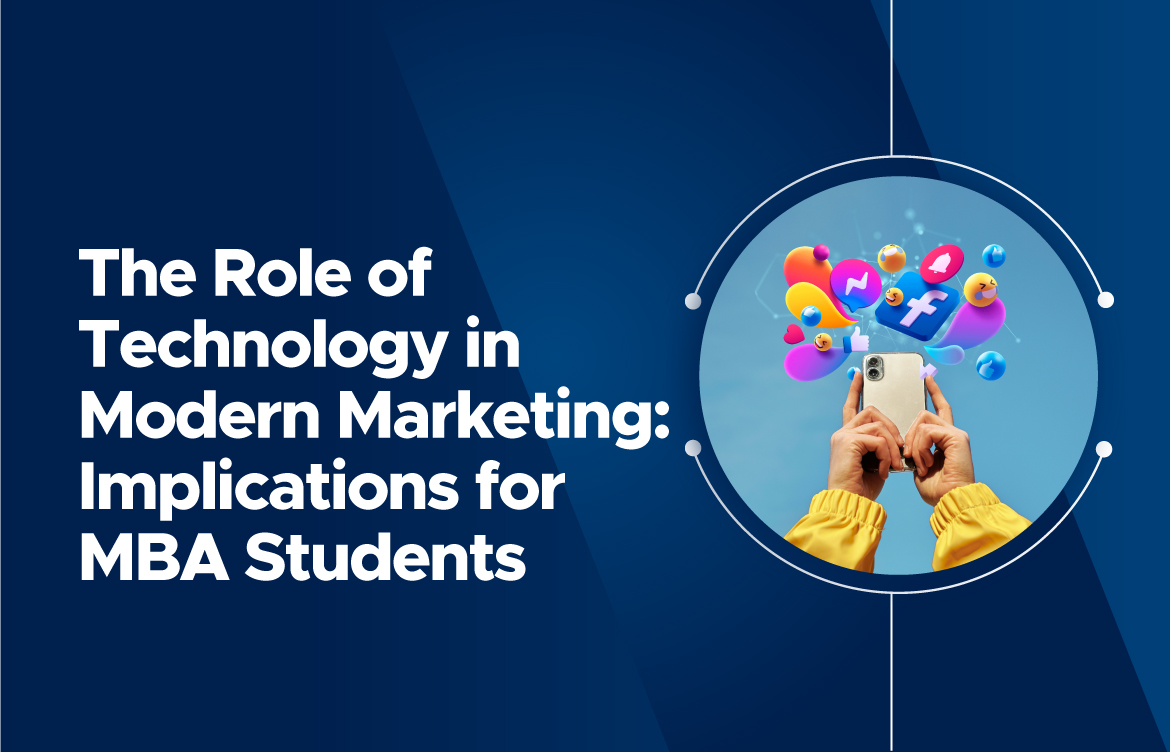Exploring The Role of Technology in Modern Marketing and Its Implications for MBA Students
Modern marketing has experienced an unexpected evolution driven primarily by advances in technology in this digitally connected world. With the growth of social media platforms and artificial intelligence, technology has become a vital tool for marketers to interact more deeply and effectively with their target audience. This change offers businesses additional problems in addition to new opportunities. In order for MBA students to remain competitive and up-to-date in the constantly changing business world they must understand the role that technology plays in modern marketing.
The Growth of Digital-Age Marketing
In the past, marketing relied mostly on print and television advertising as well as other mass media sources to reach a wide audience. But the development of the internet and the spread of digital gadgets have completely changed the way that businesses interact with their customers. Marketing is becoming more customized, and data-driven than ever before because of the huge number of technical tools and platforms available to marketers.
Social media sites like Facebook and Instagram have become effective means of promoting brands and increasing conversions. With the help of these platforms’ advanced targeting features marketers may target particular groups based on characteristics like age, interests, and online behavior. Additionally, social media tracking technologies let businesses keep an eye on discussions about their goods or services in real time. This gives them important information about the views and preferences of their target audience.
Digital marketing methods now include search engine optimization (SEO) and search engine marketing (SEM) in addition to social media. Businesses may increase their exposure in search engine results pages (SERPs). They can draw quality leads to their websites by optimizing their websites for search engines and placing bids on relevant keywords. Additionally, marketers can target users with highly relevant ads based on their browsing history and demographic data by using pay-per-click (PPC) advertising systems like Google Ads.
The Role of Data and Analytics
One of the biggest impacts of technology on modern advertising is the volume of data that companies can access. Website analytics and customer relationship management (CRM) systems allow marketers to gather an enormous amount of data regarding the preferences and purchase patterns of their target audience. Marketers can more precisely analyze the impact of their efforts and tailor their messaging using this data-driven approach.
Predictive analytics algorithms are able to assess previous data in order to predict future patterns and optimize the efficacy of advertising efforts. With AI and predictive modeling, marketers can make informed decisions that drive business growth and enhance the whole customer experience.
The Rise of Marketing Automation
The rise in popularity of marketing automation platforms and solutions is another noteworthy development in contemporary marketing. By streamlining repetitive processes like social media scheduling and email marketing, these technologies allow marketers to give more time to more strategic efforts. Businesses may nurture leads through the sales funnel and more effectively monitor campaign performance by utilizing marketing automation.
Marketing automation also makes it possible for marketers to set up complex workflows and campaigns that are activated by particular events. An online merchant might create an automated email campaign to follow up with clients who left their carts empty and provide a coupon code as a reward. Businesses may boost customer happiness and raise conversion rates by automating these procedures.
Implications for MBA Students
An MBA student’s success in the marketing industry depends on their ability to understand the function that technology plays in modern marketing. Here are some important conclusions to think about:
Technical Proficiency
In the current digital era, marketers must be proficient in technology. MBA candidates should become familiar with digital marketing platforms and technologies including Facebook Ads Manager and marketing automation software. Students can present themselves as valuable assets to employers and obtain a competitive edge in the job market by gaining technical skills.
Data Literacy
Data literacy has emerged as a crucial competency for MBA students pursuing careers in marketing given the enormous amount of data at their fingertips. Learning how to gather and evaluate data is essential for producing useful insights that influence business decisions. Additionally, for responsible management of data in marketing, an understanding of ideas like data privacy and compliance is crucial.
Adaptability
New technology and trends are arising quickly in the marketing industry which is continuously changing. In order to keep up with industry advancements and stay relevant in their jobs, MBA students need to establish a mindset of adaptability and lifelong learning. This could be going to getting certified or looking into digital marketing continuing education options.
Strategic Thinking
Although technology is an important component of contemporary marketing, strategic thinking is still very important. MBA students should gain a thorough understanding of marketing principles including positioning and market segmentation. They should also learn how to successfully incorporate technology into their strategic planning process. Through the integration of technical proficiency and strategic thinking, students may create marketing plans that propel company expansion.
The significance of technology in modern marketing cannot be emphasized. Technologies such as social media and artificial intelligence have completely changed how organizations interact with their customers and carry out their marketing campaigns. It is essential for MBA students to understand the consequences of technology if they hope to succeed in the marketing industry. In the dynamic and always-changing field of modern marketing, students can position themselves as future leaders by honing their technical proficiency and strategic thinking abilities.



